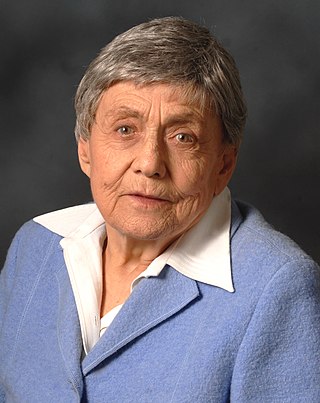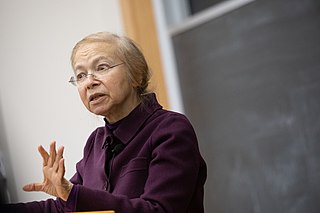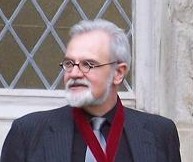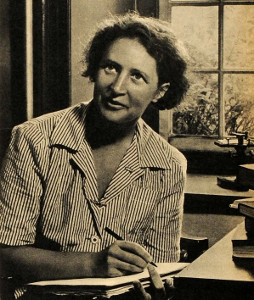Related Research Articles

A metaphor is a figure of speech that, for rhetorical effect, directly refers to one thing by mentioning another. It may provide clarity or identify hidden similarities between two different ideas. Metaphors are usually meant to create a likeness or an analogy.

Metonymy is a figure of speech in which a concept is referred to by the name of something closely associated with that thing or concept.
Literal and figurative language is a distinction that exists in all natural languages; it is studied within certain areas of language analysis, in particular stylistics, rhetoric, and semantics.

Ruth Barcan Marcus was an American academic philosopher and logician best known for her work in modal and philosophical logic. She developed the first formal systems of quantified modal logic and in so doing introduced the schema or principle known as the Barcan formula. Marcus, who originally published as Ruth C. Barcan, was, as Don Garrett notes "one of the twentieth century's most important and influential philosopher-logicians". Timothy Williamson, in a 2008 celebration of Marcus' long career, states that many of her "main ideas are not just original, and clever, and beautiful, and fascinating, and influential, and way ahead of their time, but actually – I believe – true".
The Philosophical Gourmet Report, also known as the Leiter Report or PGR, is a ranking of graduate programs in philosophy in the English-speaking world. It was founded by philosophy and law professor Brian Leiter and is now edited by philosophy professors Berit Brogaard and Christopher Pynes.

Nathan U. Salmon is an American philosopher in the analytic tradition, specializing in metaphysics, philosophy of language, and philosophy of logic.
Jonathan Schaffer is an American philosopher specializing in metaphysics and also working in epistemology, mind, and language. He is best known for his work on grounding and his development of monism, and is also a notable proponent of contrastivism.

Frances Myrna Kamm is an American philosopher specializing in normative and applied ethics. Kamm is currently the Henry Rutgers University Professor of Philosophy and Distinguished Professor of Philosophy at Rutgers University in New Brunswick, New Jersey. She is also the Littauer Professor of Philosophy and Public Policy Emerita at Harvard University's John F. Kennedy School of Government, as well as Professor Emerita in the Department of Philosophy at New York University.

Noël Carroll is an American philosopher considered to be one of the leading figures in contemporary philosophy of art. Although Carroll is best known for his work in the philosophy of film, he has also published journalism, works on philosophy of art generally, theory of media, and also philosophy of history. As of 2012, he is a distinguished professor of philosophy at the CUNY Graduate Center.
Kendall Lewis Walton is an American philosopher, the Emeritus Charles Stevenson Collegiate Professor of Philosophy and Professor of Art and Design at the University of Michigan. His work mainly deals with theoretical questions about the arts and issues of philosophy of mind, metaphysics, and philosophy of language. His book Mimesis as Make Believe: On the Foundations of the Representational Arts develops a theory of make-believe and uses it to understand the nature and varieties of representation in the arts. He has also developed an account of photography as transparent, defending the idea that we see through photographs, much as we see through telescopes or mirrors, and written extensively on pictorial representation, fiction and the emotions, the ontological status of fictional entities, the aesthetics of music, metaphor, and aesthetic value.
Adriana Cavarero is an Italian philosopher and feminist thinker. She holds the title of Professor of Political Philosophy at the Università degli studi di Verona. She has also held visiting appointments at the University of California, Berkeley and Santa Barbara, at the New York University and Harvard. Cavarero is widely recognized in Italy, Europe and the English-speaking world for her writings on feminism and theories of sexual difference, on Plato, on Hannah Arendt, on theories of narration and on a wide range of issues in political philosophy and literature.

Irony, in its broadest sense, is the juxtaposition of what on the surface appears to be the case and what is actually the case or to be expected. It typically figures as a rhetorical device and literary technique. In some philosophical contexts, however, it takes on a larger significance as an entire way of life.
Elisabeth Schellekens is a Swedish philosopher and Chair Professor of Aesthetics at Uppsala University. Previously, she was Senior Lecturer at Durham University (2006-2014). Schellekens is known for her works in aesthetics. Her research interests include aesthetic cognitivism and objectivism, aesthetic normativity, Hume, Kant, aesthetic and moral properties, conceptual art, non-perceptual or intelligible aesthetic value, the relations between perception and knowledge, the aesthetics and ethics of cultural heritage, and the interaction between aesthetic, moral, cognitive and historical value in art.

Susanne Katherina Langer was an American philosopher, writer, and educator known for her theories on the influences of art on the mind. She was one of the earliest American women to achieve an academic career in philosophy and the first woman to be professionally recognized as an American philosopher. Langer is best remembered for her 1942 book Philosophy in a New Key, which was followed by a sequel, Feeling and Form: A Theory of Art, in 1953. In 1960, Langer was elected a Fellow of the American Academy of Arts and Sciences.
Susanna Schellenberg is Distinguished Professor of Philosophy and Cognitive Science at Rutgers University, where she holds a secondary appointment at the Rutgers Center for Cognitive Science. She specializes in epistemology, philosophy of mind, and philosophy of language and is best known for her work on perceptual experience, evidence, capacities, mental content, and imagination. She is the recipient of numerous awards, including a Guggenheim Award, a Humboldt Prize, and a Mellon New Directions Fellowship for a project on the Neuroscience of Perception. She is the author of The Unity of Perception: Content, Consciousness, Evidence. The book won an honorable mention for the American Philosophical Association 2019 Sanders Book Prize.
Rae Helen Langton, FBA is an Australian-British professor of philosophy. She is currently the Knightbridge Professor of Philosophy at the University of Cambridge. She has published widely on Immanuel Kant's philosophy, moral philosophy, political philosophy, metaphysics, and feminist philosophy. She is also well known for her work on pornography and objectification.

Lynne Tirrell is Professor of Philosophy at the University of Connecticut, where she is also affiliated with the Human Rights Institute. Much of the body of her work focuses on hate speech, especially the practical effects of linguistic practices in shaping the social conditions that make genocide and other significant acts of oppression possible. Her research started in the United States but quickly branched in to other regions of the world, and now focuses on Rwanda and the surrounding region. From 2014 to 2017, she also served as the chair of the APA Committee on Public Philosophy. Her current work develops an analysis of Toxic Speech, bringing philosophy and epidemiology into conversation.
Sam Glucksberg was a Canadian professor in the Psychology Department at Princeton University in New Jersey, known for his works on figurative language: metaphors, irony, sarcasm, and idioms. He is particularly known for manipulating the Candle Problem experiment which had participants figure out the best way to erect a candle on a wall. Along with performing experiments, Glucksberg has also written Understanding Figurative Language: From Metaphors to Idioms, published by Oxford University Press in 2001.
Katharine Everett Gilbert (1886–1952) was an American philosopher who specialized in aesthetics and the philosophy of art. She was a founding trustee of the American Society for Aesthetics as well as its first woman president. Gilbert was also one of the first women to be president of a division of the American Philosophical Association. She was the first female professor at Duke University and, during her lifetime, the only female chairman of a liberal arts department.
References
- 1 2 3 4 5 6 7 8 DesAutels, Peggy. "Elisabeth Camp: January 2014". Highlighted Philosophers. American Philosophical Association. Retrieved 19 January 2014.
- 1 2 3 4 5 6 7 8 Camp, Elisabeth. "Elisabeth Camp". Rutgers University. Retrieved 20 January 2014.
- 1 2 3 Leiter, Brian. "Camp from Penn to Rutgers". Leiter Report. Retrieved 20 January 2014.
- ↑ Grant, James (July 2010). "The Dispensability of Metaphor" (PDF). The British Journal of Aesthetics. 50 (3): 255–272. doi:10.1093/aesthj/ayq018.
- ↑ Andrews, Kristin (2011). Beyond Anthropomorphism: Attributing Psychological Properties to Animals (The Oxford Handbook of Animal Ethics). Oxford University Press.
- ↑ Hills, David (2011). "Metaphor". Stanford Encyclopedia of Philosophy: Metaphor. Stanford University.